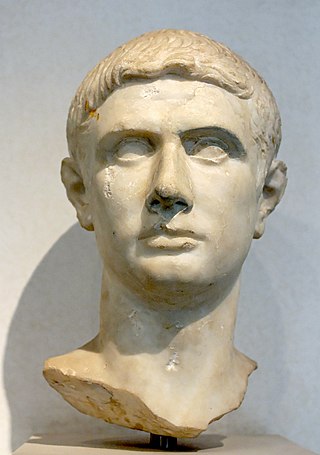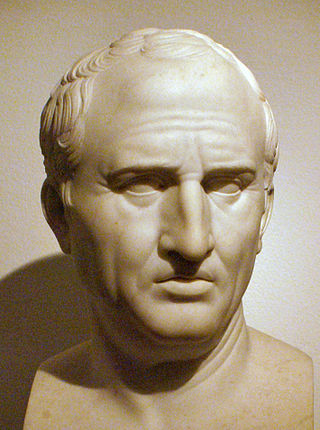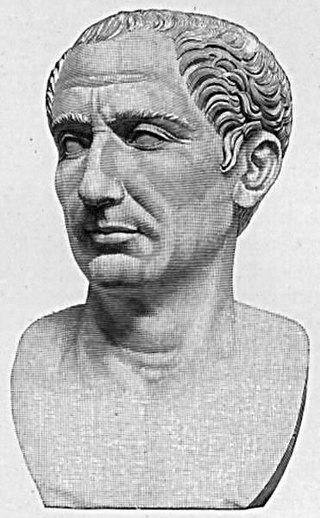

The Dialogus de oratoribus is a short work attributed to Tacitus, in dialogue form, on the art of rhetoric. Its date of composition is unknown, though its dedication to Lucius Fabius Justus places its publication around 102 AD.


The Dialogus de oratoribus is a short work attributed to Tacitus, in dialogue form, on the art of rhetoric. Its date of composition is unknown, though its dedication to Lucius Fabius Justus places its publication around 102 AD.
The dialogue itself, set in the 70s AD, follows the tradition of Cicero's speeches on philosophical and rhetorical arguments. [1] It is set in the home of Curiatius Maternus, one of the speakers, to whom two leading lawyers of the day, Marcus Aper and Julius Secundus, have come to discuss a recent event; the fourth speaker, Lucius Vipstanus Messalla, arrives later. All four men are attested historical personages. The beginning of the work is a speech in defence of eloquence and poetry. It then deals with the decadence of oratory, for which the cause is said to be the decline of the education, both in the family and in the school, of the future orator. The education is not as accurate as it once was; the teachers are not prepared, and a useless rhetoric often takes the place of the general culture.
After a lacuna, the Dialogus ends with a speech delivered by Maternus reporting what some believe is Tacitus's opinion. Maternus thinks that great oratory was possible with the freedom from any power, more precisely in the anarchy, that characterized the Roman Republic during the civil wars. It became anachronistic and impracticable in the quiet and ordered society that resulted from the institution of the Roman Empire. The peace, warranted by the Empire, should be accepted without regret for a previous age that was more favorable to the wide spread of literacy and the growth of great personality.
| Part of a series on |
| Rhetoric |
|---|
 |
Some believe that at the base of all of Tacitus's work is the acceptance of the Empire as the only power able to save the state from the chaos of the civil wars. The Empire reduced the space of the orators and of the political men, but there is no viable alternative to it. Nevertheless, Tacitus does not accept the imperial government apathetically, and he shows, as in the Agricola the remaining possibility of making choices that are dignified and useful to the state.
The date of publication of the Dialogus is uncertain, but it was probably written after the Agricola and the Germania. Many characteristics set it apart from the other works of Tacitus, so much so that its authenticity may be questioned, even if it is always grouped with the Agricola and the Germania in the manuscript tradition. The way of speaking in the Dialogus seems closer to the model of Cicero, refined but not prolix, which inspired the teaching of Quintilian; it lacks the incongruities that are typical of Tacitus's major historical works. It may have been written when Tacitus was young; its dedication to Fabius Iustus would thus give the date of publication, but not the date of writing. More probably, the unusually classical style may be explained by the fact that the Dialogus is a work of rhetoric. For this genre the structure, the language, and the style of Cicero were the usual models.

Marcus Fabius Quintilianus was a Roman educator and rhetorician born in Hispania, widely referred to in medieval schools of rhetoric and in Renaissance writing. In English translation, he is usually referred to as Quintilian, although the alternate spellings of Quintillian and Quinctilian are occasionally seen, the latter in older texts.

Classical Latin is the form of Literary Latin recognized as a literary standard by writers of the late Roman Republic and early Roman Empire. It formed parallel to Vulgar Latin around 75 BC out of Old Latin, and developed by the 3rd century AD into Late Latin. In some later periods, the former was regarded as good or proper Latin; the latter as debased, degenerate, or corrupted. The word Latin is now understood by default to mean "Classical Latin"; for example, modern Latin textbooks almost exclusively teach Classical Latin.
Lucius Annaeus Seneca the Elder, also known as Seneca the Rhetorician, was a Roman writer, born of a wealthy equestrian family of Corduba, Hispania. He wrote a collection of reminiscences about the Roman schools of rhetoric, six books of which are extant in a more or less complete state and five others in epitome only. His principal work, a history of Roman affairs from the beginning of the Civil Wars until the last years of his life, is almost entirely lost to posterity. Seneca lived through the reigns of three significant emperors; Augustus, Tiberius and Caligula. He was the father of Lucius Junius Gallio Annaeanus, best known as a Proconsul of Achaia; his second son was the dramatist and Stoic philosopher Seneca the Younger (Lucius), who was tutor of Nero, and his third son, Marcus Annaeus Mela, became the father of the poet Lucan.

The gens Julia was one of the most prominent patrician families in ancient Rome. Members of the gens attained the highest dignities of the state in the earliest times of the Republic. The first of the family to obtain the consulship was Gaius Julius Iulus in 489 BC. The gens is perhaps best known, however, for Gaius Julius Caesar, the dictator and grand uncle of the emperor Augustus, through whom the name was passed to the so-called Julio-Claudian dynasty of the first century AD. The nomen Julius became very common in imperial times, as the descendants of persons enrolled as citizens under the early emperors began to make their mark in history.
Publius Pomponius Secundus was a distinguished statesman and poet in the reigns of Tiberius, Caligula, and Claudius. He was suffect consul for the nundinium of January to June 44, succeeding the ordinary consul Gaius Sallustius Crispus Passienus and as the colleague of the other ordinary consul, Titus Statilius Taurus. Publius was on intimate terms with the elder Pliny, who wrote a biography of him, now lost.
The gens Scribonia was a plebeian family of ancient Rome. Members of this gens first appear in history at the time of the Second Punic War, but the first of the Scribonii to obtain the consulship was Gaius Scribonius Curio in 76 BC.

Cicero's Brutus is a history of Roman oratory. It is written in the form of a dialogue, in which Brutus and Atticus ask Cicero to describe the qualities of all the leading Roman orators up to their time. Cicero then attempts to propose a reconstruction of Roman history. Although it is written in the form of a dialogue, the majority of the talking is done by Cicero with occasional intervention by Brutus and Atticus. The work was probably composed in 46 BC, with the purpose of defending Cicero's own oratory. He begins with an introductory section on Greek oratory of the Attic, Asiatic, and Rhodian schools, before discussing Roman orators, beginning with Lucius Junius Brutus, "The Liberator", though becoming more specific from the time of Marcus Cornelius Cethegus.

De Oratore is a dialogue written by Cicero in 55 BC. It is set in 91 BC, when Lucius Licinius Crassus dies, just before the Social War and the civil war between Marius and Sulla, during which Marcus Antonius (orator), the other great orator of this dialogue, dies. During this year, the author faces a difficult political situation: after his return from exile in Dyrrachium, his house was destroyed by the gangs of Clodius in a time when violence was common. This was intertwined with the street politics of Rome.
Curiatius Maternus appears in the Dialogus de oratoribus of Tacitus. He was an author of tragedies in Latin, having composed a Domitius, a Medea, and a Cato by AD 74 or 75. He may be identified with the sophist Maternus who was put to death by Domitian for speaking against tyrants in a practice speech, or with either Marcus Cornelius Nigrinus Curiatius Maternus suffect consul in 83 himself, or his adoptive father.
Roman historiography stretches back to at least the 3rd century BC and was indebted to earlier Greek historiography. The Romans relied on previous models in the Greek tradition such as the works of Herodotus and Thucydides. Roman historiographical forms are usually different from their Greek counterparts, however, and often emphasize Roman concerns. The Roman style of history was based on the way that the Annals of the Pontifex Maximus, or the Annales Maximi, were recorded. The Annales Maximi include a wide array of information, including religious documents, names of consuls, deaths of priests, and various disasters throughout history. Also part of the Annales Maximi are the White Tablets, or the "Tabulae Albatae", which consist of information on the origin of the Roman Republic.

The writings of Marcus Tullius Cicero constitute one of the most renowned collections of historical and philosophical work in all of classical antiquity. Cicero was a Roman politician, lawyer, orator, political theorist, philosopher, and constitutionalist who lived during the years of 106–43 BC. He held the positions of Roman senator and Roman consul (chief-magistrate) and played a critical role in the transformation of the Roman Republic into the Roman Empire. He was extant during the rule of prominent Roman politicians, such as those of Julius Caesar, Pompey, and Marc Antony. Cicero is widely considered one of Rome's greatest orators and prose stylists.

Publius Cornelius Tacitus, known simply as Tacitus, was a Roman historian and politician. Tacitus is widely regarded as one of the greatest Roman historians by modern scholars.
Titus Cassius Severus was an ancient Roman rhetor from the gens Cassia. He was active during the reigns of Augustus and Tiberius. Cassius Severus, a fearless fighter for freedom of speech, was sharply eloquent against the new governmental order, which finally saw him exiled and his works banned after his death.

Poems by Julius Caesar are mentioned by several sources in antiquity. None are extant.
The gens Cestia was a plebeian family at ancient Rome during the later Republic, and in imperial times. The first member of the gens to obtain the consulship was Gaius Cestius Gallus in AD 35. The family's name is commemorated on two monuments, the Pons Cestius and the Pyramid of Cestius which survive into modern times.

A Dialogue Concerning Oratorical Partitions is a rhetorical treatise, written by Cicero. According to the method of the Middle Academy, the treatise is sometimes described as a "catechism of rhetoric," for it is presented in the form of questions and answers. Cicero wrote it as a handbook for his young son, Marcus, and structured the text as a dialogue between the two of them.

The Asiatic style or Asianism refers to an Ancient Greek rhetorical tendency that arose in the third century BC, which, although of minimal relevance at the time, briefly became an important point of reference in later debates about Roman oratory.
Marcus Cornelius Nigrinus Curiatius Maternus was a Roman senator and general during the reign of Domitian. He was suffect consul during the nundinium of September to October AD 83 with Lucius Calventius Sextius Carminius Vetus. Although some experts consider him a rival with Trajan as heir apparent to the emperor Nerva, he is primarily known from inscriptions.
Lucius Fabius Justus was a Roman senator who occupied a number of offices in the imperial service. He also served as suffect consul in 102, replacing Lucius Licinius Sura as the colleague of the consul who opened the year, Lucius Julius Ursus Servianus; both Justus and Servianus closed their nundinium at the end of April.
The gens Urbinia was an obscure plebeian family at ancient Rome. Only a few members of this gens are mentioned by Roman writers, but others are known from inscriptions.